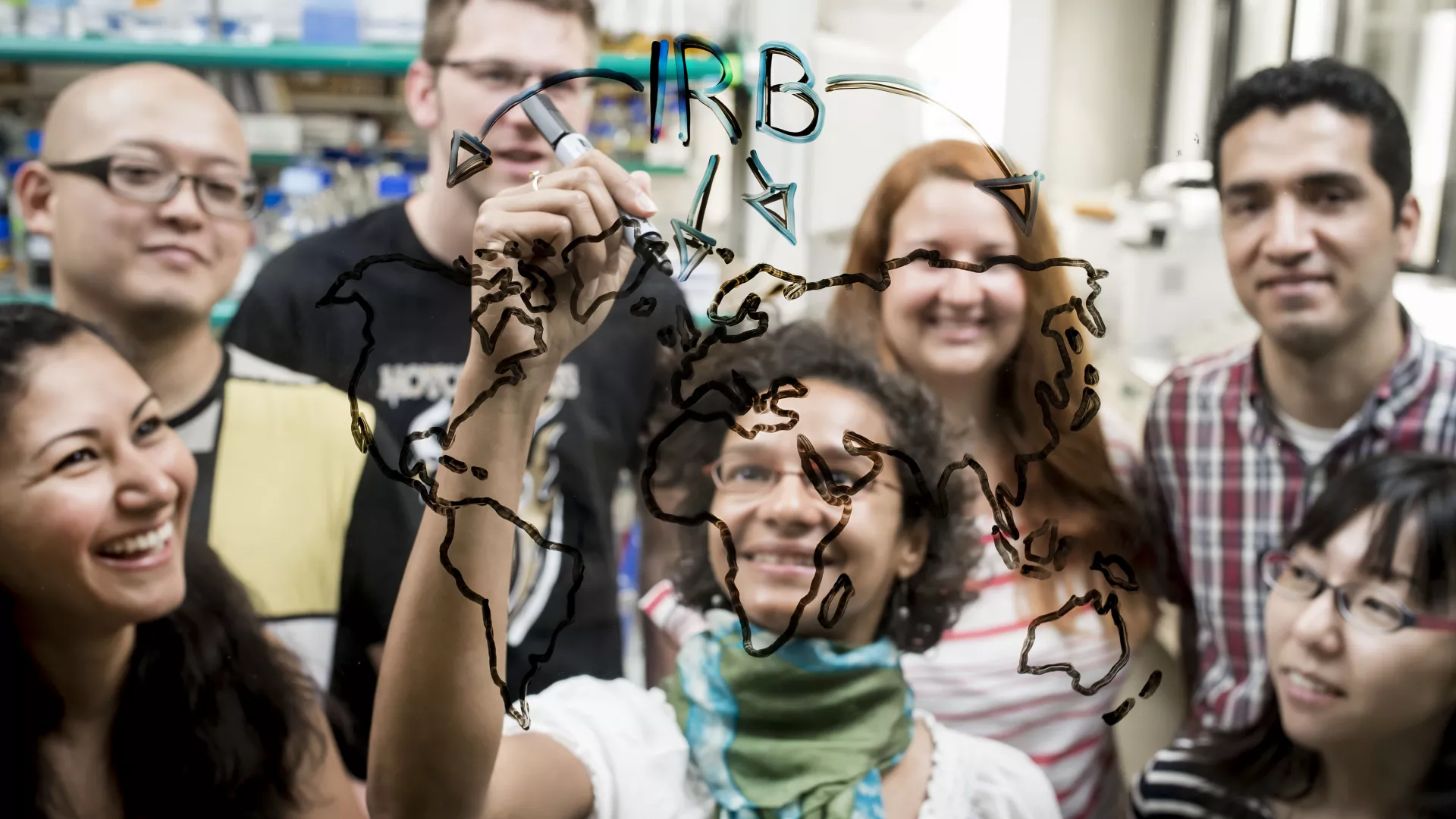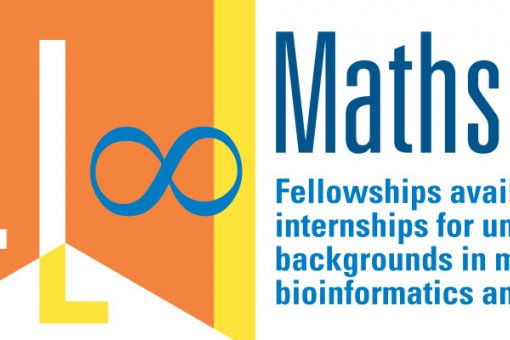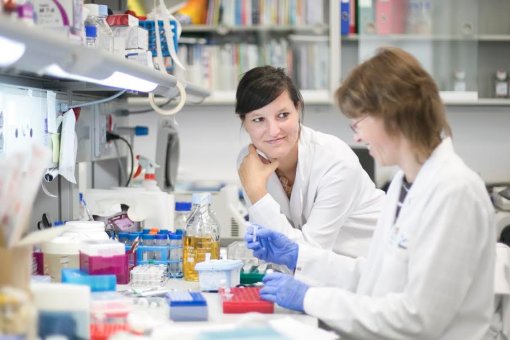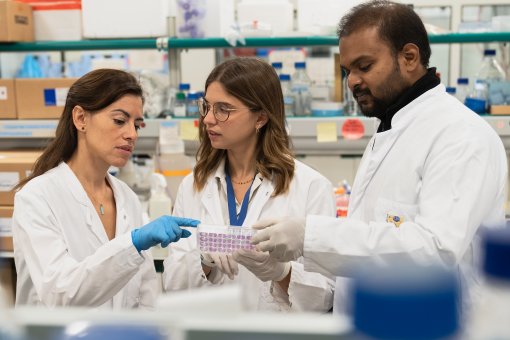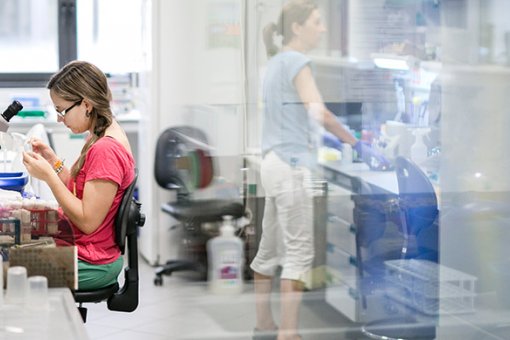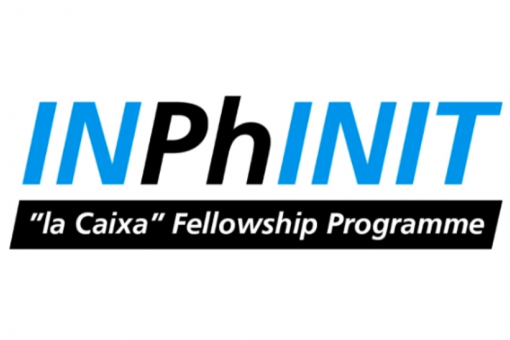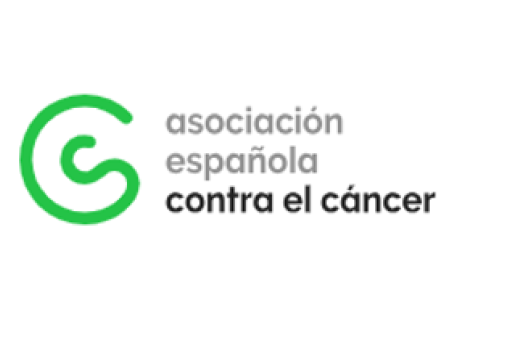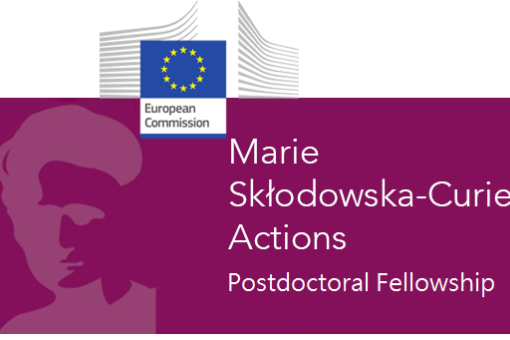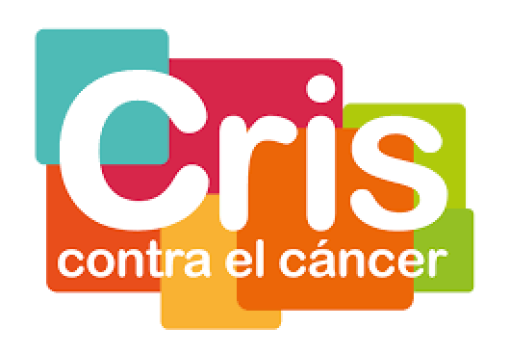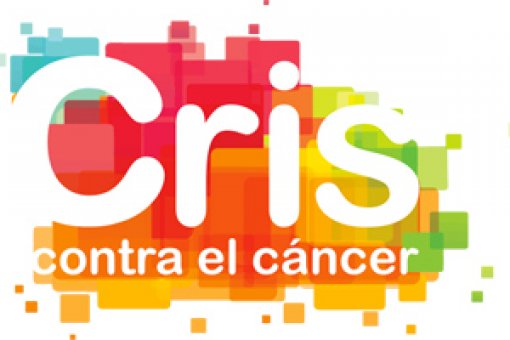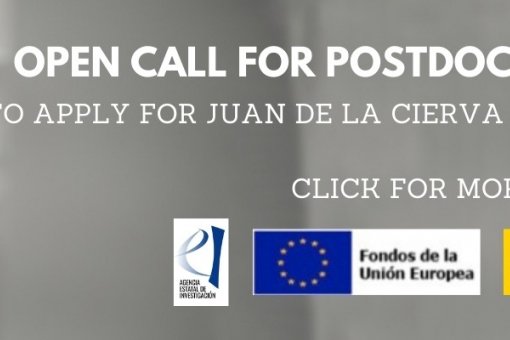El IRB Barcelona es un brillante instituto multidisciplinario donde los científicos abordan de forma colaborativa problemas biomédicos urgentes y que constituyen un desafío, para proporcionar soluciones innovadoras a necesidades médicas no satisfechas.
Únete al IRB Barcelona y realiza tu investigación en uno de sus 28 laboratorios de última generación que abordan temas punteros en cáncer/metástasis, envejecimiento y reprogramación celular, metabolismo, diferenciación celular o genómica, entre otros.
A los investigadores, en cualquier nivel de su carrera, se les ofrecerá una formación personalizada y amplias oportunidades de desarrollo profesional.

Programa Universitario
Un programa de formación para futuras generaciones de investigadores
Los programas de becas universitarias del IRB Barcelona se dirigen a estudiantes de grado y máster con fuertes capacidades e interés en los campos de la biología, la biomedicina, la química, la física, la farmacia, la biología estructural, las ciencias computacionales u otras áreas relacionadas.
Los becarios tienen la oportunidad de participar en actividades institucionales de la entidad. Además, reciben formación complementaria de desarrollo profesional mediante la serie de cursos internos o ad hoc organizados.
Contacto
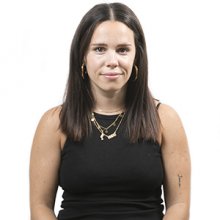
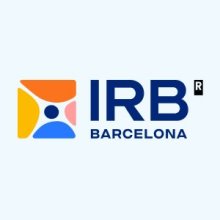
+info: phd@irbbarcelona.org
Oportunidades programa universitario
Programa Predoctoral
Una base sólida para una carrera exitosa en biomedicina
Oportunidades predoctorales
La formación es una forma de vida en el IRB Barcelona. Al unirse al Instituto, los jóvenes científicos se introducen en un mundo de oportunidades en que pueden investigar y formarse en un entorno internacional y multidisciplinario único. Los estudiantes de doctorado reciben una estrecha tutela, tienen acceso a una amplia variedad de actividades y servicios científicos y pueden aprovechar una extensa red de contactos académicos e industriales. Nuestro objetivo es estimular a los jóvenes talentos para desarrollar proyectos creativos de excelencia y convertirse en futuros líderes en el mundo académico o industrial.
Cerca de 100 estudiantes (casi la mitad de ellos de nacionalidades no españolas) trabajan actualmente en la realización de sus tesis doctorales en el IRB Barcelona.
Los estudiantes trabajan en un proyecto de investigación que se elige de mutuo acuerdo con su respectivo líder de grupo. Además, la participación en todas las actividades del día a día de sus laboratorios les permite aprender distintas habilidades y técnicas.
Aparte de las convocatorias predoctorales internas del IRB Barcelona, los estudiantes de doctorado que se incorporan al Instituto también pueden presentarse a convocatorias competitivas externas que otorguen becas de doctorado. Los ejemplos más frecuentes en el Instituto son las becas predoctorales del Ministerio de Economía y Competitividad y del Ministerio de Educación y Cultura, entre otras. Los estudiantes de doctorado que se incorporan al IRB Barcelona tienen que cumplir con las normas de admisión del Instituto.
Todos los doctorandos (para cualquier beca o contrato no institucional) son entrevistados de forma individual (es decir, no competitiva) por un comité de selección que redacta un informe para ayudar al IRB Barcelona a reclutar a los mejores candidatos y garantizar los estándares de calidad.
Además de la supervisión diaria por parte de los directores de tesis, un comité asesor de tesis realiza un seguimiento de los estudios del alumno durante todo su doctorado. Dicho comité está formado por tres miembros, de los cuales por lo menos uno es un jefe de grupo o investigador asociado del IRB Barcelona, y otro, un asesor externo. Al final de cada año, los alumnos elaboran un informe sobre su trabajo y lo discuten con su comité asesor de tesis. Al finalizar su trabajo práctico, los alumnos deben escribir su tesis y defenderla con éxito en la universidad en la que estén matriculados.
El IRB Barcelona no es una universidad y no puede conceder títulos de doctorado. Por lo tanto, los candidatos seleccionados deberán matricularse en una universidad de su elección para obtener el título de doctor.
Las universidades locales son: Universitat de Barcelona, Universitat Autònoma de Barcelona, Universitat Politècnica de Catalunya o Universitat Pompeu Fabra.
A la vez que completan las asignaturas de sus cursos en una universidad de su elección, los alumnos realizan simultáneamente su formación práctica y trabajan para su tesis en un laboratorio de investigación del IRB Barcelona. En general, los alumnos pasan hasta cuatro años en el IRB Barcelona, después de los cuales finalizan y defienden su tesis.
El título de doctor lo otorga la universidad en la que estén matriculados.
Además del trabajo de laboratorio, los doctorandos del IRB Barcelona participan en distintas actividades.
- Retiro de estudiantes de doctorado. Evento de dos días de duración que se organiza cada dos años para celebrar la actividad investigadora de los alumnos de doctorado del IRB Barcelona. Las actividades incluyen charlas de doctorandos actuales y antiguos, sesiones de pósters y muchas oportunidades de intercambio.
- Simposio de estudiantes de doctorado. El simposio de estudiantes de doctorado es un evento organizado bianualmente por los alumnos de doctorado del IRB Barcelona y en el que los jóvenes científicos tienen la oportunidad de participar en todos los aspectos de diseño y gestión de un evento científico complejo. Los eventos se han celebrado en 2009, 2011, 2013, 2015, 2017, 2018 y 2019. Esta última edición tuvo lugar entre el 13 y el 15 de noviembre en Nijmegen, Holanda (simposio ENABLE). En estos simposios, ganadores del Premio Nobel y los mejores científicos se reúnen y discuten con los investigadores más jóvenes sobre temas de vanguardia e interdisciplinarios en un ambiente relajado e informal.
- Estancias breves. Se anima a los estudiantes a realizar al menos una estancia en el extranjero durante su formación. La estancia puede estar subvencionada por becas de movilidad o fondos internos. Algunos ejemplos de centros anfitriones son el Massachusetts Institute of Technology-MIT (EE.UU.) y el Weizmann Institute of Science (Israel); universidades como la Universidad de Harvard y el ETH Zurich (Suiza); y hospitales como el MD Anderson Cancer Center (EE.UU.), entre muchos otros. El IRB Barcelona también está preparado y deseoso de recibir visitantes de institutos de todo el mundo. Cada año acoge a más de 50 investigadores visitantes, incluyendo estudiantes de doctorado.
- Formación complementaria y cursos. El IRB Barcelona promueve una serie de actividades orientadas a la formación complementaria con el fin de reforzar el conjunto de habilidades de los estudiantes predoctorales, como los talleres sobre "Cómo mejorar la escritura científica", los seminarios de "Innovación y transferencia de tecnología" o el taller de "Comunicación científica en inglés".
- Seminarios Barcelona BioMed. Destacados científicos internacionales son invitados para presentar y discutir sus resultados e ideas en una serie de seminarios semanales. Estas sesiones permiten a los estudiantes de doctorado conocer los últimos avances en las ciencias de la vida y les dan la oportunidad de tener un contacto directo con los ponentes de los seminarios. También se anima a los doctorandos a invitar a ponentes de su propia elección.
- Clubes de revistas. Investigadores de todos los niveles debaten sobre publicaciones científicas recientes en varios clubes de revistas.
- Actividades de comunicación. Los estudiantes de doctorado también practican sus habilidades de comunicación a través de presentaciones periódicas, talleres y asistencia a eventos educativos y con participación del público.
- Actividades sociales. Los doctorandos del IRB Barcelona también participan en actividades de interacción social, como las sesiones "cool-off" mensuales, en las que la comunidad estudiantil se reúne de manera informal para disfrutar de un aperitivo y charlar en la terraza del Instituto.
- Retiros de grupo y de programa. Los científicos del IRB Barcelona participan regularmente en retiros, tanto a nivel de grupo como de programa. Estas actividades, que se celebran en emplazamientos con atractivo paisajístico fuera de las instalaciones, ofrecen la oportunidad de mantener un intenso debate científico y una interacción social, y tienen como objetivo fomentar la colaboración entre grupos y programas.
El Consejo de Alumnos de Doctorado del IRB Barcelona se encarga de organizar las actividades dirigidas a los estudiantes, como las sesiones "cool-off", así como de la comunicación entre la comunidad estudiantil y la dirección del Instituto. El Consejo se fundó en 2008 y consta de nueve miembros que se reúnen mensualmente para hablar de temas de actualidad y eventos futuros. Para contactar con ellos, puedes escribir a la dirección de correo electrónico student_council@irbbarcelona.org
Organizamos actividades específicas para los estudiantes de doctorado durante su primer año en el Instituto.
- Curso de iniciación. Este curso, impartido a principios de septiembre, presenta las unidades y plataformas del IRB Barcelona y el PCB, y proporciona información que puede ser de utilidad durante el período de formación del doctorando en el Instituto, así como información sobre Barcelona.
- Rotaciones de laboratorio durante el primer semestre del primer año académico. Las rotaciones ofrecen a los estudiantes la oportunidad de experimentar diferentes entornos de laboratorio y enfoques experimentales, así como de conocer a miembros de laboratorios de otros grupos, fomentando así posibles colaboraciones futuras.
- Programa Pasos. El programa Pasos funciona emparejando a un estudiante de doctorado nuevo con un estudiante de doctorado voluntario, llamado "guía", que lleva un año o más tiempo en el IRB Barcelona.
El inglés es la lengua de trabajo en el IRB Barcelona. Algunas universidades imparten las clases del plan de estudios científicos en inglés, mientras que otras universidades locales dan las clases en catalán y/o español y, algunas, en inglés. Por lo tanto, el IRB Barcelona ofrece a todos sus miembros la oportunidad de asistir a clases de inglés y español para mejorar su nivel de idioma.
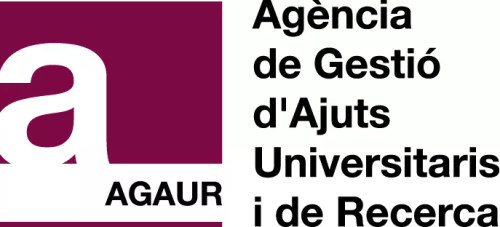

Según el artículo 11 de las bases reguladoras de las ayudas Joan Oró para la contratación de personal investigador predoctoral en formación (FI-2025) RESOLUCIÓN REU/3320/2024 de 16 de septiembre, se publica la priorización de las Ayudas Joan Oró FI 2025.
A su vez, se abre un periodo de alegaciones que finalizará el próximo 18 de febrero de 2025.
Contacto


+info: phd@irbbarcelona.org
Programa IRB Dream
Programa de becas predoctorales IRB: atrayendo talento internacional
El programa de becas predoctorales del IRB (IRB DREAM) es un programa de becas doctorales gestionado por el Instituto de Investigación Biomédica (IRB Barcelona). Ha ofrecido 10 becas de cuatro años en dos convocatorias separadas (2021 y 2022). Estas becas están destinadas a jóvenestalentos para realizar sus tesis doctorales en uno de los 28 laboratorios del Instituto. IRB DREAM pretende revitalizar el Programa de Doctorado actual del Instituto, que ya es reconocido por la excelencia en la investigación, añadiendo una dimensión innovadora, concretamente la personalización tanto de la oferta formativa como del desarrollo profesional.
El IRB Barcelona ya cuenta con un sólido Programa de Doctorado, que se ha consolidado desde su lanzamiento en 2008. Además de las actividades de investigación realizadas por los investigadores predoctorales (de ahora en adelante referidos como investigadores en fase temprana (ESRs), tienen acceso a una amplia gama de actividades complementarias diseñadas específicamente para impulsar sus carreras profesionales. Estas actividades van desde iniciativas interdisciplinarias, como rotaciones de laboratorio y retiros de doctorandos, hasta seminarios científicos de alta calidad y talleres de competencias transferibles con un fuerte enfoque en negocios y emprendimiento. El programa ya ofrece a sus ESRs herramientas para empoderarlos y permitirles continuar persiguiendo carreras científicas brillantes.
IRB DREAM ofrece a los becados:
- Condiciones laborales y de ocupación excepcionales, con salarios que están significativamente por encima de los estándares nacionales.
- Excelentes supervisión y mentoría por parte de los Jefes de Grupo altamente experimentados y de investigadores externos tanto del sector académico como del no académico.
- Acceso a laboratorios de primer nivel que llevan a cabo investigación multidisciplinaria en la interfaz entre química, biología y medicina.
- Exposición a un entorno internacional e intersectorial y acceso a una amplia red de colaboradores internacionales, empresas y hospitales.
- Amplia oferta formativa con asesoramiento personalizado y profesional, con el objetivo de identificar los cursos de formación opcional más adecuados que coincidan con los intereses y habilidades de los becados.
- Apoyo personalizado para el desarrollo profesional a través de los Asesores Profesionales del IRB.
- Cursos de idiomas gratuitos (catalán, castellano e inglés) ofrecidos en el Instituto y sin coste.
- Actividades sociales, como las "Cool off" mensuales, donde los miembros se reúnen informalmente para tomar bebidas, aperitivos y discutir sobre ciencia en la cafetería, la Liga de Fútbol y el viaje anual de esquí.
- Una cultura saludable que promueve y facilita el bienestar como parte integral de la identidad de la institución.
- Asistencia con la reubicación y visados por parte del personal de Recursos Humanos.
IRB DREAM recluta futuros investigadores en fase temprana (ESRs) de cualquier nacionalidad, género, cultura, religión, orientación sexual o edad para realizar un doctorado en biomedicina.
- Cumplir con la norma de movilidad: no tiene que haber residido o realizado su actividad principal (trabajo, estudios, etc.) en España durando más de 12 meses en los 3 años inmediatamente anteriores a la convocatoria.
- Cumplir con la definición ESR de COFUND: en el momento del reclutamiento por parte del IRB Barcelona, tienen que estar en los primeros cuatro años (experiencia investigadora equivalente a tiempo completo) de sus carreras de investigación y no haber obtenido un grado doctoral.
- Cumplir una de las opciones siguientes (requisitos obligatorios segundos el proceso de Bolonia para poderse inscribir en un programa de doctorado en el momento del reclutamiento efectivo)
- Finalización de estudios que conduzcan a un título universitario oficial español (o de otro país del Espacio Europeo de Educación Superior) que otorgue 300 créditos ECTS, de los cuales al menos 60 créditos ECTS correspondan a nivel de máster.
- Finalización de un grado en una universidad no española no adaptada al Espacio Europeo de Educación Superior que dé acceso a estudios de doctorado en Biología, Química, Bioquímica, Farmacia, Física, Medicina o campos relacionados en España.
- Enviar la solicitud completa, a través de la aplicación electrónica IRB_DREAM, antes de la fecha límite establecida. Se pedirá a los solicitantes que proporcionen la siguiente información:
- Información personal como nombre y apellidos, género, nacionalidad y datos de contacto. En esta sección también se preguntará sobre las solicitudes para otras becas o la intención de solicitarlas.
- Curriculum vitae.
- Carta de motivación (máximo 2 páginas) destacando la experiencia en investigación y los éxitos académicos y explicando por qué están interesados en el IRB Barcelona y en un grupo de investigación particular.
- Una copia escaneada del expediente académico certificado. Estos documentos tienen que mostrar las calificaciones obtenidas en los periodos de examen y evidenciar que el título requerido se obtendrá en el momento previsto de reclutamiento si todavía no ha sido otorgado.
- Cualquier archivo adicional considerado relevante para la solicitud.
- Al menos dos cartas de recomendación de profesores universitarios o científicos que conozcan su trabajo académico y puedan juzgar su potencial como investigador predoctoral. Se proporcionará una plantilla de carta, incluyendo preguntas breves de evaluación. Los solicitantes serán responsables de asegurar que los referentes envíen estas cartas.
- Un resumen de cualquier experiencia laboral y un máximo de tres grupos de investigación en los cuales estén interesados.
Los candidatos son seleccionados exclusivamente por mérito, en función de su currículum. Se valoran las calificaciones académicas y el curriculum vitae de cada solicitante, así como las cartas de recomendación y la carta de motivación. No se aplican criterios de selección para discriminación positiva o negativa.
Contacto mejorado con un entorno intersectorial e interdisciplinario, y movilidad internacional mediante estancias y nuevas iniciativas:
- Exposición ampliada a un entorno intersectorial a través del apoyo personalizado del personal del Departamento de Innovación y la oportunidad de visitar y hacer estancias en empresas y hospitales, gracias a una nueva acción estratégica que tiene como objetivo aumentar la colaboración con el sistema hospitalario de Cataluña.
- Exposición garantizada a un entorno interdisciplinario a nivel local, regional y nacional, gracias a las colaboraciones y acuerdos existentes en Barcelona, Cataluña y España. Dentro del IRB Barcelona, los becados estarán expuestos en una amplia gama de disciplinas y tendrán la oportunidad de participar en actividades como seminarios semanales de Nodo de Investigación y seminarios de Biomed, conferencias anuales, rotaciones de laboratorio, retiros de doctorandos, el Consejo de Estudiantes, etc.
- Movilidad internacional garantizada, gracias a la inclusión de objetivos en sus planes de desarrollo profesional durante su primer año de doctorado, incluyendo la participación en talleres internacionales, conferencias, seminarios y actividades internacionales. Los becados también tendrán estancias internacionales garantizadas, gracias a las asignaciones específicas de costes de viaje y bonificaciones. A partir del segundo año del IRB_DREAM, los becados tendrán la oportunidad de presentar su plan de estancia a su respectivo Comité Asesor de Tesis (TAC).
Estructura de supervisión mejorada con mayor exposición a la dimensión 3i: La estructura de supervisión incluirá (i) el equipo de supervisión de la tesis, formado por el supervisor, que será el Jefe de Grupo del laboratorio que acoge las actividades de investigación de los becados, así como el co-supervisor (el Jefe de Grupo de la institución de estancia); (ii) el TAC, responsable de las mentorías, seguimiento y orientación de los becados en todos los aspectos relacionados con su tesis. Los TACs tendrán un miembro externo adicional del sector no académico para reforzar la dimensión intersectorial; y (iii) apoyo personalizado para el desarrollo profesional a través de los Asesores de Carrera, que guiarán a los becados durante sus carreras y los ayudarán, junto con el equipo de supervisión, a preparar y revisar sus Planes Personales de Desarrollo de Carrera (PCDP) cada año.
- Institute for Molecular Life Sciences (RIMLS), Países Bajos
- Institute de Pharmacologie et de Biologie Structurale (IPBS), Francia
- European Molecular Biology Laboratory (EMBL-EBI), Reino Unido
- Genome Institute of Singapore (GIS), Singapur
- RMIT University (RMIT), Australia
- University of Copenhagen-Center for Protein Research (CPR), Dinamarca
- Politecnico di Milano (POLIMI), Italia
- Diabetes Complications Research Center-University College Dublin (UCD-DCRC), Irlanda
- Universidade nova de Lisboa (ITQB-NOVA), Portugal
- Centre national de la Recherche Scientifique (IGFL-CNRS), Francia
- Hokkaido University, Japón
- European School of Molecular Medicine (SEMM), Italia
- Systems Biology-University College Dublin (Systems Biology Ireland), Irlanda
- University of Helsinki, Finlandia
- VIB, Bélgica
Las acciones Marie Skłodowska-Curie (MSCA) proporcionan becas para todas las etapas de la carrera de los investigadores—ya sean candidatos a doctorado o investigadores altamente experimentados—y fomentan la movilidad transnacional, intersectorial e interdisciplinaria. Las MSCA permiten a organizaciones centradas en la investigación (universidades, centros de investigación y empresas) acoger investigadores extranjeros con talento y crear colaboraciones estratégicas con instituciones líderes en todo el mundo.
Las MSCA tienen como objetivo dotar a los investigadores con las habilidades necesarias y experiencia internacional para una carrera exitosa, ya sea en el sector público o privado. El programa responde a los retos a los cuales se enfrentan los investigadores, ofreciéndoles condiciones laborales atractivas y la oportunidad de moverse entre el ámbito académico y otros entornos.
Las MSCA están abiertas a todos los campos de la investigación y la innovación, desde la investigación básica hasta su adopción en la industria y los servicios de innovación. Los campos de investigación e innovación son elegidos libremente por los solicitantes (individuos y/u organizaciones) de manera completamente ascendente.
Para más información, por favor, visita las siguientes páginas web:
Contact


+info: phd@irbbarcelona.org
IRB Dream Opportunities
Programa IRB Target
Programa Internacional de Doctorado IRB Barcelona: en TARGET para la biomedicina de alto impacto
El IRB Barcelona es un instituto multidisciplinario donde los científicos abordan problemas biomédicos desafiantes y urgentes de manera colaborativa para así ofrecer soluciones innovadoras a necesidades médicas no cubiertas.
El programa doctoral IRB-TARGET reúne una red de 21 instituciones para implementar un itinerario de formación orientado al impacto, alineado con el objetivo estratégico del IRB de acercar la ciencia fundamental a la investigación aplicada y clínica. A través de dos convocatorias separadas (2023 y 2024), IRB-TARGET ofrecerá 10 becas de cuatro años a candidatos a doctorado excepcionales, quienes podrán elegir y desarrollar un sólido proyecto de investigación dentro de uno de los seis nodos de investigación interdisciplinarios establecidos en el IRB.
IRB-TARGET está dirigido a investigadores jóvenes talentosos que deseen realizar sus tesis doctorales en uno de sus 28 laboratorios que abordan temas de vanguardia en cáncer/metástasis, envejecimiento y reprogramación celular, metabolismo, diferenciación celular y genómica, entre otros. En el contexto de colaboración inter- y multidisciplinaria entre grupos, países (más de 100 colaboraciones internacionales) y sectores (academia, industria u hospitales), IRB-TARGET ofrece una formación personalizada y amplias oportunidades de desarrollo profesional. Este innovador programa de formación destaca por fomentar estancias y otras iniciativas altamente valoradas, que están destinadas a fortalecer las perspectivas profesionales de los candidatos a doctorado.
IRB-TARGET ofrece:
- Condiciones de trabajo y empleo excepcionales, con salarios significativamente superiores a los estándares nacionales.
- Excelente supervisión y mentoría por parte de los Jefes de Grupo altamente experimentados y de investigadores externos tanto del sector académico como del no académico.
- Acceso a laboratorios de primer nivel que llevan a cabo investigación multidisciplinaria en la interfaz entre química, biología y medicina.
- Exposición a un entorno internacional e intersectorial y acceso a una amplia red de colaboradores internacionales, empresas y hospitales.
- Itinerario de formación doctoral personalizado compuesto por varios componentes obligatorios y opcionales, categorizados en investigación, formación y compromiso, que los beneficiarios completarán para complementar su trabajo de investigación (dedicación requerida de 200 horas).
- Estancia o desplazamiento de investigación obligatorio como parte del itinerario de formación doctoral (laboratorio de investigación, industria u hospital).
- Integración del Plan de Desarrollo Profesional Personalizado en la estructura de supervisión y la armonización de los objetivos de investigación y desarrollo profesional mediante un enfoque de formación holística que incorpora apoyo especializado de HFP.
- Cursos de idiomas gratuitos (catalán, español e inglés) ofrecidos en el Instituto y sin coste.
- Actividades sociales, como las "Cool-off” mensuales, donde los miembros se reúnen informalmente para tomar bebidas, aperitivos y discutir sobre ciencia en la cafetería, la Liga de Fútbol y el viaje anual de esquí.
- Una cultura saludable que promueve y facilita el bienestar como parte integral de la identidad de la institución.
- Asistencia con la reubicación y visados por parte del Departamento de Recursos Humanos y apoyo personalizado de bienvenida con mentoría entre iguales.
Co-funded by the European Union. Views and opinions expressed are however those of author(s) only and do not necessarily reflect those of the European Union or the European Research Executive Agency. Neither the European Union nor the European Research Executive Agency can be held responsible for them.
IRB TARGET reclutará futuros investigadores en fase temprana (ESRs) de cualquier nacionalidad, género, cultura, religión, orientación sexual o edad para realizar un doctorado en biomedicina. Para ser elegible para una beca IRB_TARGET, los solicitantes deben:
- Cumplir con la norma de movilidad: no tiene que haber residido o realizado su actividad principal (trabajo, estudios, etc.) en España durante más de 12 meses en los 3 años inmediatamente anteriores a la convocatoria.
- No estar en posesión de un título de doctor en el plazo de la convocatoria. Los candidatos que hayan defendido con éxito su tesis doctoral no serán considerados elegibles, aunque no hayan obtenido formalmente el título de doctor.
- Cumplir una de las opciones siguientes (requisitos obligatorios segundos el proceso de Bolonia para poderse inscribir en un programa de doctorado en el momento del reclutamiento efectivo)
- Finalización de estudios que conduzcan a un título universitario oficial español (o de otro país del Espacio Europeo de Educación Superior) que otorgue 300 créditos ECTS, de los cuales al menos 60 créditos ECTS correspondan a nivel de máster.
- Finalización de un grado en una universidad no española no adaptada al Espacio Europeo de Educación Superior que dé acceso a estudios de doctorado en Biología, Química, Bioquímica, Farmacia, Física, Medicina o campos relacionados en España.
- Enviar la solicitud completa, a través de la aplicación electrónica IRB_TARGET, antes de la fecha límite establecida. Se pedirá a los solicitantes que proporcionen la siguiente información:
- Información personal como nombre y apellidos, género, nacionalidad y datos de contacto. En esta sección también se preguntará sobre las solicitudes para otras becas o la intención de solicitarlas.
- Curriculum vitae.
- Carta de motivación (máximo 2 páginas) destacando la experiencia en investigación y los éxitos académicos y explicando por qué están interesados en el IRB Barcelona y en un grupo de investigación en particular.
- Una copia escaneada del expediente académico certificado. Estos documentos tienen que mostrar las calificaciones obtenidas en los periodos de examen y evidenciar que el título requerido se obtendrá en el momento previsto de reclutamiento si todavía no ha sido otorgado.
- Cualquier archivo adicional considerado relevante para la solicitud.
- Al menos dos cartas de recomendación de profesores universitarios o científicos que conozcan su trabajo académico y puedan juzgar su potencial como investigador predoctoral. Se proporcionará una plantilla de carta, incluyendo preguntas breves de evaluación. Los solicitantes serán responsables de asegurar que los referentes envíen estas cartas.
- Un resumen de cualquier experiencia laboral y un máximo de tres grupos de investigación en los cuales estén interesados.
Los candidatos son seleccionados exclusivamente por mérito, en función de su currículum. Se valoran las calificaciones académicas y el curriculum vitae de cada solicitante, así como las cartas de recomendación y la carta de motivación. No se aplican criterios de selección para discriminación positiva o negativa.
Cada beneficiario del programa IRB-TARGET construirá su propio itinerario de formación doctoral único, adaptado a sus necesidades de investigación, académicas, profesionales y personales. Esto los preparará para distinguirse durante y después de su formación doctoral. El itinerario personalizado del IRB-TARGET estará compuesto por varios componentes obligatorios y opcionales que los beneficiarios completarán para complementar su trabajo de investigación, categorizado en investigación, formación y compromiso. El itinerario será definido en colaboración con el equipo supervisor y se reflejará en su Plan de Desarrollo Profesional Personal (PCDP, en inglés). Los beneficiarios tendrán que completar una dedicación mínima requerida (200 horas) para cada categoría y subcategoría para completar con éxito el programa IRB-TARGET.
Los principales componentes de este itinerario incluyen (ver tabla a continuación):
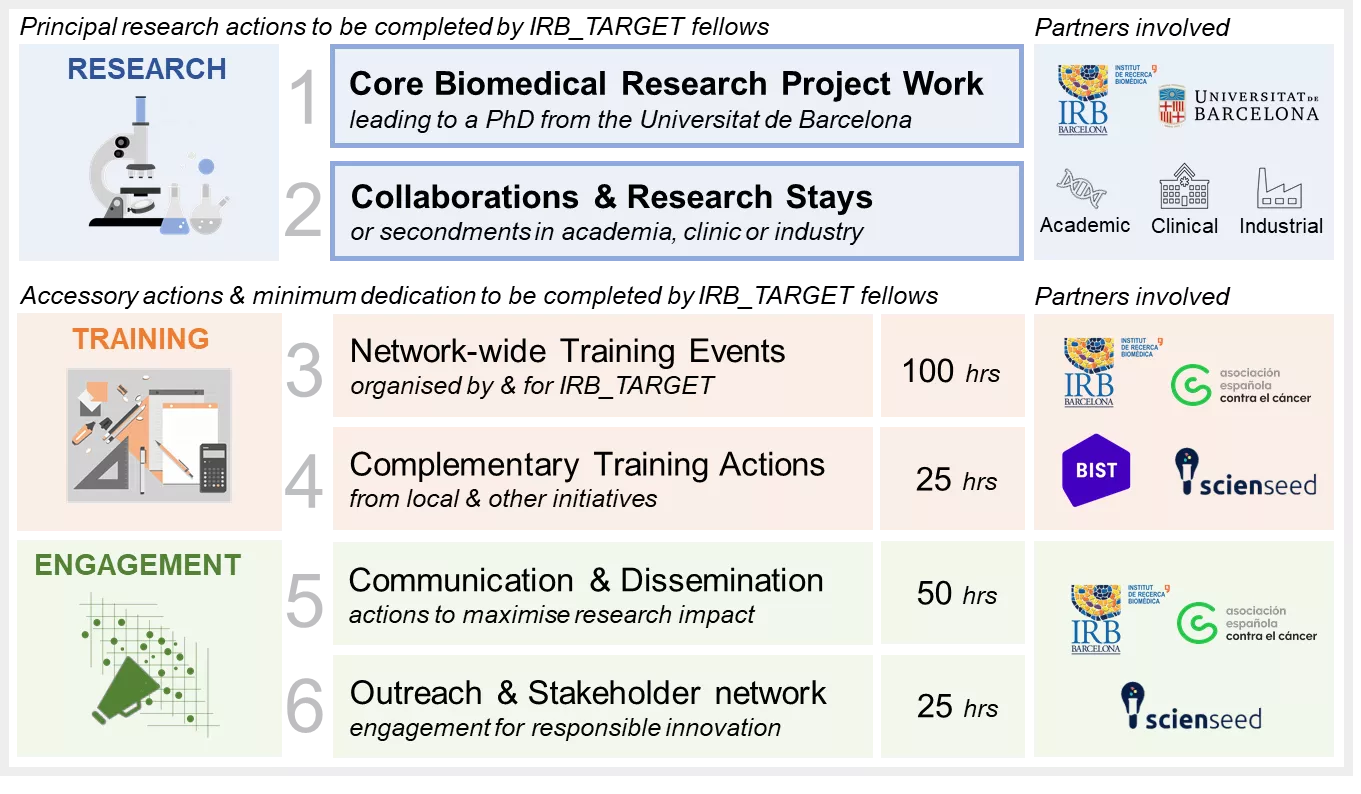
- Proyecto de investigación biomédica central: Los beneficiarios emprenderán un proyecto de investigación en un campo determinado bajo la supervisión de un Jefe de Grupo, que conducirá a la obtención de un doctorado en la Universitat de Barcelona. Enriquecerán esta formación investigadora mediante la participación semanal en reuniones de grupo (laboratorio), seminarios interdisciplinarios y plenarios, retiros de doctorado y simposios.
- Colaboraciones y estancias en academia, entorno clínico o industria (1-3 meses): Mediante una estancia corta, los beneficiarios IRB-TARGET tendrán que completar una estancia de investigación obligatoria como parte de su itinerario de formación doctoral, salvo que sea explícitamente desaconsejado por su Comité Asesor de Tesis (TAC).
- Actividades de formación en red organizadas por la IRB-TARGET (100 horas): Estas actividades de formación obligatorias proporcionarán a los beneficiarios conocimientos, habilidades y experiencia en varias áreas básicas que son esenciales para su formación doctoral, incluyendo integridad de la investigación, género en la investigación, habilidades emprendedoras, ciencia abierta y gestión de datos de investigación, y comunicación.
- Acciones de formación complementarias de iniciativas locales y otras (25 horas): Los beneficiarios tendrán la oportunidad de elegir las sesiones y temas de formación que mejor se adapten a sus necesidades e intereses.
- Acciones de comunicación y difusión para maximizar el impacto de la investigación (50 horas): Después de haber realizado un curso de formación obligatorio en comunicación impartido por Scienseed y haber tenido la oportunidad de perfeccionar estas habilidades a nivel institucional mediante la participación y presentación en reuniones de grupo, seminarios de nodo y seminarios plenarios, se les pedirá a los beneficiarios que desarrollen todavía más sus habilidades de comunicación y difusión.
- Compromiso de la red entre las partes interesadas y la divulgación por una innovación responsable (25 horas): (a) Con el apoyo del Departamento de Comunicación del IRB Barcelona y del Oficial de Participación Pública en particular, los beneficiarios IRB-TARGET contribuirán a acciones de divulgación para difundir la ciencia al público general. (b) Para involucrarse con los interesados y/o usuarios finales de los investigadores biomédicos, los beneficiarios IRB-TARGET organizarán, conducirán y amplificarán el impacto de un programa de tertulia en línea para discutir temas importantes respecto a ciencia, investigación y políticas con invitados que representen los principales interesados.
Cada becado cuenta con los siguientes apoyos en la implementación y revisión de su PCDP: el Jefe de Grupo y lo(s) co-supervisor(es), incluyendo lo(s) laboratorio(s) de la estancia; el Comité Asesor de Tesis (TAC); y el equipo de apoyo profesional.
Los beneficiarios IRB-TARGET obtendrán el título de doctor por la Universitat de Barcelona. Podéis encontrar más información sobre los programas de doctorado disponibles en esta universidad aquí.
Fundació de Recerca Clínic Barcelona-Institut d’Investigacions Biomèdiques August Pi i Sunyer
Fundació Privada per a la Recerca i la Docència Sant Joan de Déu (FSJD-CERCA)
Fundació Privada Institut d’Investigació Oncològica de Vall d’Hebron (VHIO)
Radboud University Medical Centre (Radboudumc)
Josep Carreras Leukaemia Research Institute
European Molecular Biology Laboratory
University of Groningen, Groningen Research Institute of Pharmacy (GRIP)
School of Biomedical Science, McGill University
National University of Ireland Galway
Università degli Studi di Torino, Molecular Biotechnology Center (MCB)
Las acciones Marie Skłodowska-Curie (MSCA) proporcionan becas para todas las etapas de la carrera de los investigadores—ya sea para candidatos a doctorado o investigadores altamente experimentados—y fomentan la movilidad transnacional, intersectorial e interdisciplinaria. Las MSCA permiten a organizaciones centradas en la investigación (universidades, centros de investigación y empresas) acoger investigadores extranjeros con talento y crear colaboraciones estratégicas con instituciones líderes en todo el mundo.
Las MSCA tienen como objetivo dotar a los investigadores con las habilidades necesarias y la experiencia internacional para una carrera exitosa, ya sea en el sector público como en el privado. El programa responde a los retos a los cuales se enfrentan los investigadores, ofreciéndoles condiciones laborales atractivas y la oportunidad de moverse entre el ámbito académico y otros entornos.
Las MSCA están abiertas en todos los campos de la investigación y la innovación, desde la investigación básica hasta su adopción en la industria y los servicios de innovación. Los campos de investigación e innovación son elegidos libremente por los solicitantes (individuos y/u organizaciones) de manera completamente ascendente.
Para más información, por favor, visita las siguientes páginas web:
Contact


+info: phd@irbbarcelona.org
IRB Target Opportunities
Programa postdoctoral
Apoyo y oportunidades para posdoctorados en una etapa crítica de su carrera
Los becarios posdoctorales que se unen al IRB Barcelona tienen acceso a las oportunidades de formación avanzada en investigación y desarrollo profesional del Instituto, todo ello en un competitivo entorno internacional.
Consciente que los posdoctorados se hallan en una etapa crítica de su carrera profesional, el IRB Barcelona quiere proporcionarles el apoyo científico, técnico y administrativo que necesitan para sobresalir. Los posdoctorados suelen incorporarse al IRB Barcelona con una beca externa obtenida a través de agencias nacionales e internacionales.
Enfoque en la interdisciplinariedad
Periódicamente se ofrecen cursos y talleres sobre temas de especial interés para los posdoctorados. Estos incluyen administración de laboratorios, comunicación y ciencias y redacción de subvenciones, entre otros. Los posdoctorados también pueden aprovechar las numerosas conferencias, seminarios y demás eventos de la serie Barcelona BioMed.
Al igual que la comunidad de estudiantes de doctorado, los posdoctorados tienen un interés activo en promover actividades de cohesión entre sus compañeros. En este sentido, el Consejo Posdoctoral organiza eventos y actividades científicas y sociales y actúa como enlace con la administración del IRB Barcelona.
Contacta con el Consejo Posdoctoral si deseas obtener más información sobre la vida de los posdoctorados en el Instituto.
Un ejemplo de las numerosas actividades posdoctorales es el Postdoc Day anual, que reúne a científicos de todos los programas de investigación para mostrar sus últimos resultados y explorar posibilidades de colaboración.
Contacto


+info: phd@irbbarcelona.org
